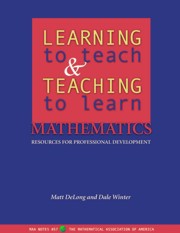Book contents
- Frontmatter
- Preface
- Contents
- 1 The Professional Development Program
- 2 How to Use this Book
- 3 An Orientation Session for the Beginning of the Semester
- 4 Making In-class Groups Work
- 5 Getting Students to Read the Textbook
- 6 Assessing and Evaluating Students' Work
- 7 Managing Homework Teams
- 8 Teaching During Office Hours
- 9 Establishing and Maintaining Control in Your Classroom
- 10 Proctoring Tests and Examinations
- 11 Teaching with Calculators and Computers
- 12 Making Lesson Plans
- 13 Strategies for Motivating Students
- 14 Dealing With Difficult Instructor-Student Situations
- 15 End-of-Semester Administration
- 16 Adapting Materials and Designing Your Own Meetings
- 17 Classroom Visits
- A Tips for Running Meetings
- B The Michigan Introductory Program
- Bibliography
1 - The Professional Development Program
- Frontmatter
- Preface
- Contents
- 1 The Professional Development Program
- 2 How to Use this Book
- 3 An Orientation Session for the Beginning of the Semester
- 4 Making In-class Groups Work
- 5 Getting Students to Read the Textbook
- 6 Assessing and Evaluating Students' Work
- 7 Managing Homework Teams
- 8 Teaching During Office Hours
- 9 Establishing and Maintaining Control in Your Classroom
- 10 Proctoring Tests and Examinations
- 11 Teaching with Calculators and Computers
- 12 Making Lesson Plans
- 13 Strategies for Motivating Students
- 14 Dealing With Difficult Instructor-Student Situations
- 15 End-of-Semester Administration
- 16 Adapting Materials and Designing Your Own Meetings
- 17 Classroom Visits
- A Tips for Running Meetings
- B The Michigan Introductory Program
- Bibliography
Summary
Overview
We believe that it is important for a mathematics department to be actively involved in the professional development of its faculty and graduate students. By professional development we mean the training, assessment, and improvement of teaching skills and practices. Professional development that comes from within the mathematics department, rather than through non-disciplinary channels, is more likely to be meaningful and credible to the instructors who are involved. For example, sensibilities about teaching mathematics are sometimes quite different from those in other disciplines. Compare what is meant by “read the textbook” in a mathematics class to what is meant by the same statement in a literature or history class. In addition, the types and standards of argumentation and precision are different in the mathematics department than they are elsewhere. Moreover, there are certain obstacles that are more prevalent in mathematics than elsewhere. For instance, innumeracy and mathematical illiteracy are far more socially acceptable, or even favored, than is an inability to read or write. For these and other reasons, we feel that the best place for training and supporting mathematics instructors is within the mathematics department.
We believe that an effective way for a mathematics department to train its inexperienced instructors, and to support and develop its other faculty members and graduate students is through an integrated professional development program that includes four components.
- Type
- Chapter
- Information
- Learning to Teach and Teaching to Learn MathematicsResources for Professional Development, pp. 1 - 6Publisher: Mathematical Association of AmericaPrint publication year: 2002

